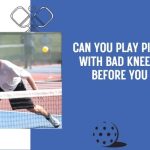Pickleball is a fun and exciting sport that’s gained popularity over the years. However, like any other physical activity, it has risks and injuries. One common injury among athletes is a torn meniscus – a painful condition that affects the knee joint.
If you’re an avid pickleball player dealing with this injury or wondering whether to continue playing despite a torn meniscus, you’ve come to the right place!
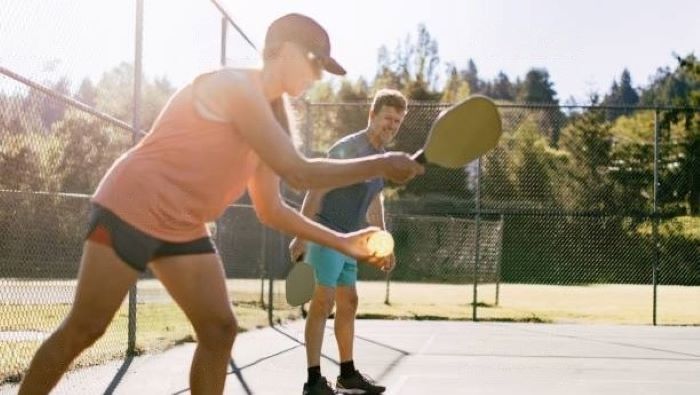
This blog post will explore everything you need about pickleball with a torn meniscus. We’ll cover everything from understanding how it can happen to managing your condition while still enjoying the game. So let’s dive in!
Can You Play Pickleball With Torn Meniscus?
The short answer is yes, you can play pickleball with a torn meniscus, but not advisable. This is because it strains the knee joint and can further damage the ligaments or even cause more meniscus tears. Therefore, doctors usually advise playing pickleball or any sport after surgery or till it repairs the tear, which requires running or jumping.
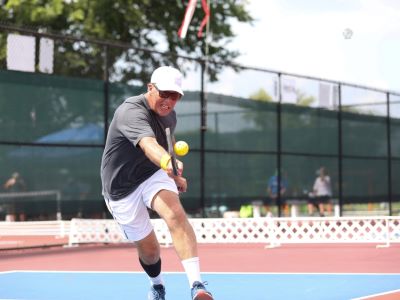
However, there are some players who play pickleball at low levels with the doctor’s permission. The key is to ensure that would be no sudden movements or jumps during the gameplay, which can hurt your knee joint.
Try playing on soft turf rather than hard courts, as that will reduce the impact on your joints. Also, make sure you wear appropriate gear such as knee braces or pads so that any falls may not put much pressure on your knees directly or indirectly.
Playing pickleball with a torn meniscus isn’t recommended by medical professionals unless they approve it – some individuals may be able to use preventive measures such as wearing protective gear and playing on soft surfaces to reduce the risk of reinjury while enjoying pickleball!
How Can Pickleball Lead to a Torn Meniscus?
If players are not careful, pickleball’s fast-paced nature can lead to injuries such as a torn meniscus. A meniscus tear is an injury to the cartilage in the knee joint. It often occurs when an individual suddenly twists or rotates their knee while playing sports like pickleball.
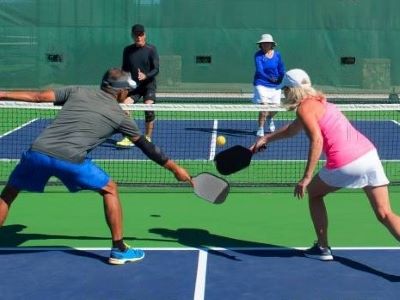
This type of injury typically causes pain, swelling, difficulty moving the knee joint, and instability in the affected area. Players must warm up properly before exercising to reduce their risk of a torn meniscus while playing pickleball.
They must also use proper techniques when hitting shots during gameplay. Additionally, wearing appropriate footwear with adequate shock absorption cushioning can reduce knee stress during playtime.
Read More:
- Can you play pickleball on a sport court?
- Can you play pickleball on grass?
- Can I bring a pickleball paddle on a plane?
The Risks of Playing With a Torn Meniscus
Pickleball can also pose some risks for people with a torn meniscus, a common knee injury that affects the cartilage cushion between the thigh bone and the shin bone. Some of the risks of playing pickleball with a torn meniscus are:
Tear Aggravation
Playing pickleball involves sudden stops, changes in direction, pivoting, and jumping, which can stress the knee joint and the meniscus. These movements can worsen the tear or cause new tears in the cartilage, leading to more pain, swelling, and instability in the knee.
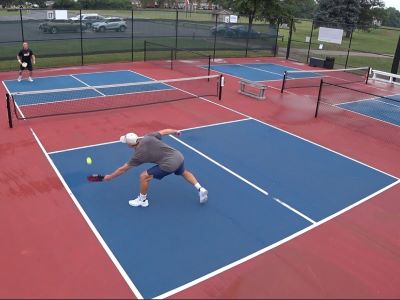
Increased Danger of Falling
A torn meniscus can impair the stability and function of the knee, making it more challenging to balance and move smoothly. It can increase the risk of falling or tripping while playing pickleball, resulting in further injuries to the knee or other parts of the body.
Delayed Healing
Playing pickleball with a torn meniscus can delay the healing process and prolong recovery. The repeated stress on the knee can prevent the cartilage from repairing itself or healing correctly. Over time, it can lead to chronic pain, inflammation, and knee joint degeneration.
When to Avoid Playing Pickleball With Torn Meniscus?
Pickleball can also be risky for people with a torn meniscus, a common knee injury affecting the cartilage cushion between the thigh and shin bones. A torn meniscus can cause pain, swelling, stiffness, and reduced range of motion in the knee.

There are some situations when you should avoid playing pickleball with a torn meniscus, such as:
Immediately After the Tear
If you suspect you have a torn meniscus, stop playing pickleball immediately and seek medical attention. Playing with a torn meniscus can worsen the injury and cause more damage to the cartilage and the knee joint.
You should get a proper diagnosis and treatment plan from your doctor, who may recommend rest, ice, compression, elevation, medication, brace, or surgery, depending on the severity of your tear.
After Surgery
If you have undergone surgery to repair your torn meniscus, you should avoid playing pickleball until your doctor clears you. The recovery time after surgery can vary depending on the type of surgery, the extent of the tear, and your healing process.

Generally, it can take 4 to 12 weeks or longer to recover from meniscus surgery fully. You should follow your doctor’s instructions and complete a rehabilitation program that includes exercises to strengthen and stretch your knee muscles and improve your range of motion.
You should gradually resume your physical activities and avoid high-impact or twisting movements that can stress your knee.
Pickleball can be dangerous for your knee health if you have a torn meniscus. Play pickleball with torn meniscus only after your knee is fully healed and stable after a fresh tear or surgery. You can prevent further complications and enjoy the sport safely.
How to Manage Torn Meniscus While Playing Pickleball?
A torn meniscus can cause pain, swelling, stiffness, and reduced range of motion in the knee. If you have a torn meniscus and want to continue playing pickleball, you should follow some tips to manage your injury and prevent further complications, such as:
Warm-up Properly
Before playing pickleball, you should warm up your muscles and joints with light cardio and dynamic stretches. It can help improve your blood flow, flexibility, and mobility and reduce the risk of injury. You should also avoid cold or damp environments that can stiffen your knee.

Modify Gameplay
When playing pickleball, you should avoid any movements that can aggravate your torn meniscus, such as sudden stops, changes in direction, pivoting, and jumping. You should also limit the intensity and duration of your gameplay and choose a level of play that matches your ability and comfort. You can also play doubles instead of singles to reduce the amount of running and covering the court.
Use Proper Equipment
Wear comfortable and supportive shoes that fit well and have good cushioning and traction. You should also use a lightweight paddle that suits your grip size and style. Consider wearing a knee brace or a sleeve to compress and stabilize your knee joint.
Listen to Your Body
You should pay attention to any signs or symptoms of pain or discomfort in your knee while playing pickleball. If you feel any pain or swelling in your knee, you should stop playing immediately and apply ice to the affected area.
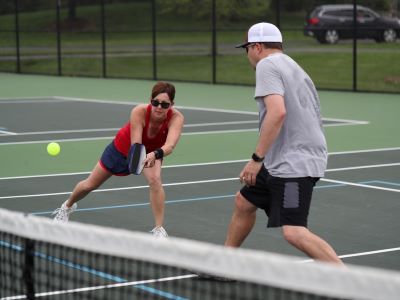
You should also rest your knee until the pain subsides and take anti-inflammatory medications if needed. You should consult your doctor if the pain persists or worsens.
Follow a Rehabilitation Program
You should follow a rehabilitation program that includes exercises to strengthen and stretch your knee muscles and improve your range of motion. You should consult your doctor or a physical therapist for a personalized program that suits your condition and goals. You should also perform the exercises regularly and correctly to ensure optimal results.
Take Breaks
You should take frequent breaks from playing pickleball to rest and recover your knee. You should also avoid playing pickleball on consecutive days or multiple times daily. You should give your knee enough time to heal between sessions and avoid any activities that can stress your knee.

Communicate With Your Partner
If you are playing doubles, you should communicate about your injury and limitations. You should let them know what movements you can or cannot do and what areas of the court you can or cannot cover. You should also ask them for help or support if needed.
Pickleball with a torn meniscus can be manageable if you follow some tips to protect your knee. Also, you should consult your doctor before playing pickleball with a torn meniscus and follow their advice on treatment and recovery. In this way, you can enjoy the sport safely and comfortably.
Meniscus Injury and Pickleball: Factors to Consider
Pickleball can also be risky for people with a meniscus injury, a common knee injury that affects the cartilage cushion between the thigh bone and the shin bone. A meniscus injury can cause pain, swelling, stiffness, and reduced range of motion in the knee.
If you have a meniscus injury and want to play pickleball, you should consider some factors before deciding whether to play or not, such as:
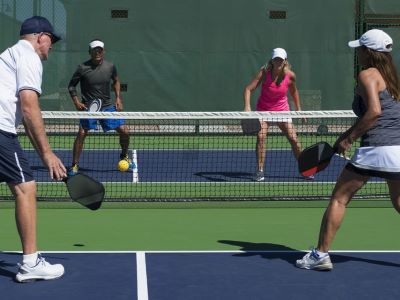
The Tear’s Severity
Your meniscus tear can affect your ability and safety to play pickleball. Different types and grades of meniscus tears range from mild to severe. Some tears may heal independently with rest and conservative treatment, while others may require surgery to repair or remove the damaged cartilage.
You should consult your doctor for a proper diagnosis and treatment plan for your meniscus tear and follow their advice on when and how to resume physical activity.
Pain and Discomfort
Pain and discomfort are common symptoms of a meniscus injury and can affect your performance and enjoyment of pickleball. Pain can limit your range of motion, strength, and stability in your knee, making it difficult to move and play effectively.
Discomfort can distract you from the game and reduce your concentration and confidence. You should listen to your body and stop playing if you feel any pain or discomfort in your knee. You should also use pain relief methods such as ice, medication, or a brace as needed.
The Danger of Further Damage
Playing pickleball with a meniscus injury can risk further damage to your knee joint and cartilage. Playing pickleball involves sudden stops, changes in direction, pivoting, and jumping, which can stress the knee joint and the meniscus.
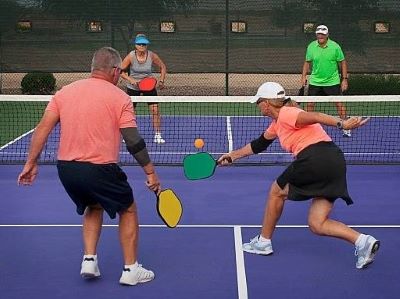
These movements can worsen the tear or cause new tears in the cartilage, leading to more pain, swelling, and instability in the knee. They can also cause chronic inflammation and degeneration of the knee joint over time.
You should avoid playing pickleball if you have a fresh tear or after surgery until your knee is fully healed and stable. You should also modify your gameplay and use proper equipment to reduce the stress on your knee.
FAQs
A torn meniscus is a tear in the rubbery cartilage that cushions the knee joint. It can occur during any sudden twisting, turning, or stopping activity. Symptoms of a torn meniscus include pain, swelling, and difficulty straightening or bending the knee.
Yes, a torn meniscus can worsen while playing pickleball if it is not treated correctly. If the tear is severe enough, it could lead to more serious damage and even require surgery.
It typically takes 6-8 weeks for a torn meniscus to heal. However, recovery time can vary depending on the severity of the tear and the individual’s overall health.
A torn meniscus can heal only if the tear is small and located in a part of the meniscus with adequate blood supply. It is because blood carries healing factors to the injured tissue and helps it repair itself. However, most tears are large or located in a part of the meniscus with poor or no blood supply. It means they cannot heal on their own. These tears require medical treatment, such as rest, medication, physical therapy, or surgery, to relieve pain and restore function.
Wrap Up!
Concluding the article “Can you play pickleball with a torn meniscus?“
Therefore, it is not recommended to play pickleball with a torn meniscus. Doing so could further injure the knee joint and cause long-term damage or even require surgery to repair. If you are dealing with a torn meniscus, seeking medical advice from your doctor before attempting any activity involving the affected area is best.
So, if you have torn meniscus consult the doctor, and then start playing your game. Be safe and happy pickleballing!

I am a professional physiotherapist and the author of the BallSportsPro. I worked with athletes of all levels, from amateur to professional, and i helped them overcome injuries and improve their performance. I am a certified Pickleball instructor and has been playing the sport for over 10 years.

